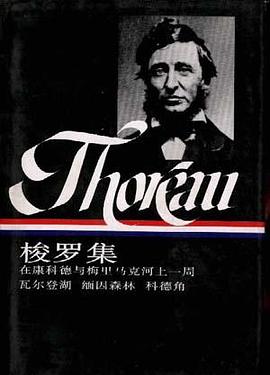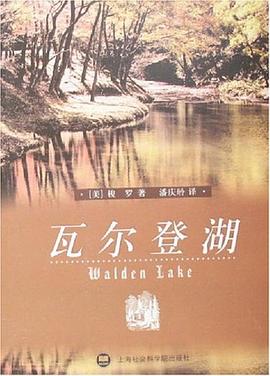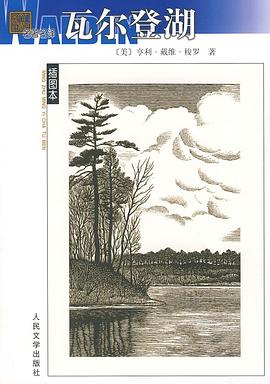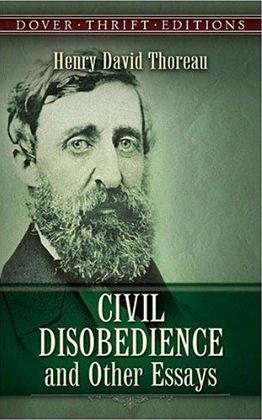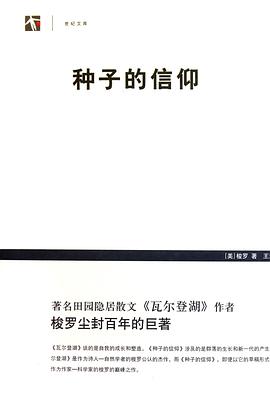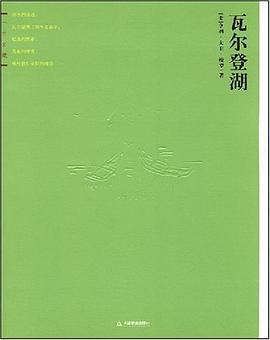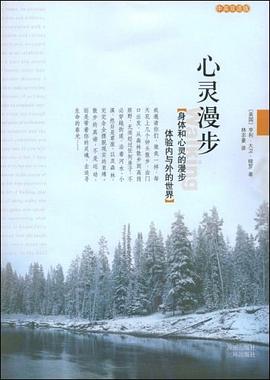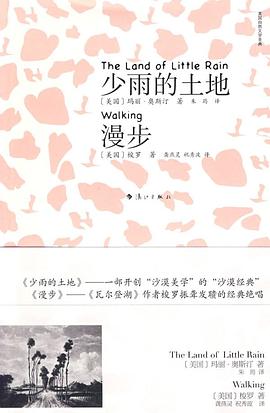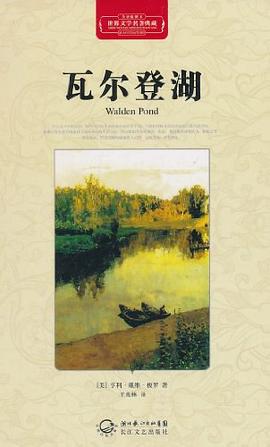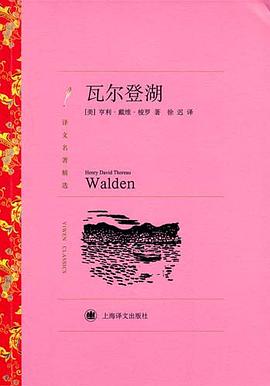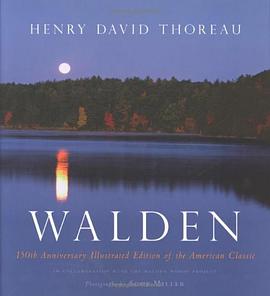

具体描述
Published in association with the Walden Woods Project, this beautiful commemorative edition of Thoreau's masterpiece features spectacular color photographs that capture Walden as vividly as Thoreau's words do.
Henry David Thoreau was just a few days short of his twenty-eighth birthday when he built a cabin on the shore of Walden Pond and began one of the most famous experiments in living in American history. Originally he was not, apparently, intending to write a book about his life at the pond, but nine years later, in August of 1854, Houghton Mifflin's predecessor, Ticknor and Fields, published Walden; or, a Life in the Woods. At the time the book was largely ignored, and it took five years to sell out the first printing of two thousand copies. It was not until 1862, the year of Thoreau's death, that the book was brought back into print, and it has never been out of print since. Published in hundreds of editions and translated into virtually every modern language, it has become one of the most widely read and influential books ever written.
作者简介
SCOT MILLER is a professional photographer whose photographs have appeared in numerous books and publications, including Walden: The 150th Anniversary Illustrated Edition of the American Classic and Cape Cod: Illustrated Edition of the American Classic . Miller lives in Dallas, Texas, with his wife, Marilyn, where they operate Sun to Moon Gallery, a fine art photography gallery.
Biography
Henry David Thoreau was born on July 12, 1817, in Concord, Massachusetts, the third of four children. His family lived on a modest, sometimes meager, income; his father, John, worked by turns as a farmer, schoolteacher, grocer, and pencil-maker; his mother, Cynthia, was a teacher and would take in boarders when money was scarce. Young Henry's gifts manifested themselves early. He wrote his first piece, "The Seasons," at age ten, and memorized portions of Shakespeare, the Bible, and Samuel Johnson while studying at the Center School and Concord Academy. In addition to his academic pursuits, Henry rambled through the countryside on exploratory walks and attended lectures at the Concord Lyceum, where as an adult he would fascinate audiences with his discourses on life on Walden Pond.
Thoreau began his studies at Harvard College in 1833. His years at Harvard were stimulating, if solitary; he immersed himself in a traditional humanities curriculum of multiple languages, anatomy, history, and geography. Upon graduation in 1837, he began teaching in Concord at the Center School, the public school he'd attended as a boy, but left his post after being told to administer corporal punishment to a student. During these years following college Thoreau published his first essay and poem, began lecturing at the Concord Lyceum, and attended Transcendentalist discussions at the home of his mentor, the renowned essayist and poet Ralph Waldo Emerson. At Emerson's urging, Thoreau started a journal -- a project that would become his lifelong passion and culminate in more than two million words.
A boat trip with his brother, John, in 1839 set the foundation for his well known work A Week on the Concord and Merrimack Rivers. Sadly, unforeseen tragedy separated the tightly knit brothers in 1842, when John died of lockjaw caused by a razor cut. The following year, Thoreau joined Emerson in editing the Transcendental periodical The Dial, a publication to which Thoreau would become a prolific contributor. He also pulled up stakes for a time, accepting a position to tutor Emerson's children in Staten Island, New York. Half a year later, Thoreau returned to his family's house in Concord, deeply affected by the abolitionists he had met in Manhattan. He dedicated much of his time to lectures and essays advocating abolition and became involved in sheltering runaway slaves on their journey north.
In 1846 Thoreau was briefly imprisoned for refusing to pay a poll tax to the village of Concord, in protest against the government's support of slavery, as well as its war of expansion with Mexico. His experience in the Concord jail led to the writing of what would later be titled "Civil Disobedience." Unappreciated in Thoreau's lifetime, "Civil Disobedience" is now considered one of the country's seminal political works.
During this period, Thoreau built his cabin on Walden Pond and lived there for a little more than two years. In this small home on Emerson's property, he began writing his most enduring work, Walden; or, Life in the Woods, and finished the manuscript for A Week on the Concord and Merrimack Rivers. Sales were exceedingly poor, with Thoreau eventually acquiring 706 unsold copies of the original 1000 copy print run. Thoreau quipped, "I have now a library of nearly nine hundred volumes, over seven hundred of which I wrote myself." When Walden was published in 1854, sales were brisk and its reception favorable, although Thoreau's work as a whole remained somewhat obscure during his lifetime.
By the time Walden was published, Thoreau had turned from the largely symbolic approach to nature that he had learned from Emerson and other Romantic writers to a much more empirical approach, more in keeping with new scientific methods. His observations of nature throughout the 1850s, largely recorded in his journals, have come to be regarded as a model of ecological attentiveness, even though the term "ecology" was not coined until 1866. He developed several talks on the natural history of the Concord region, and even set to work on a series of longer, book-length manuscripts. Two of these, one on the dispersal of tree seeds and the other on the region's many wild fruits, were not published until 1993 and 2000 respectively. Today, Thoreau's writing is valued for both the poetic imagination and the scientific methodology it displays.
As the years passed, Thoreau's commitment to the antislavery movement strengthened, as did his popularity as a lecturer and essayist. Even in the declining health of his later years, he remained a man of conviction and action, writing on many subjects and participating in various political causes until shortly before his death from tuberculosis. George Eliot's review of Walden singles out qualities that attract readers to this day: "a deep poetic sensibility" and "a refined as well as a hardy mind." Henry David Thoreau died on May 6, 1862, in Concord.
目录信息
Economy 1
Where I Lived, and What I Lived For 61
Reading 75
Sounds 85
Solitude 101
Visitors 110
The Bean-Field 123
The Village 133
The Ponds 139
Baker Farm 161
Higher Laws 168
Brute Neighbors 179
House-Warming 191
Former Inhabitants; and Winter Visitors 205
Winter Animals 217
The Pond in Winter 228
Spring 243
Conclusion 259
A Statement from the Walden Woods Project 271
Artist's Statement 273
List of Illustrations 275
Then & Now 276
· · · · · · (收起)
读后感
《瓦尔登湖》徐迟译本,是好不容易读完的。时隔两年,虽然对于《瓦尔登湖》的具体内容已经记不清,但某些句子的印象还是有的。然而重读王家湘的译本时,竟然完全不觉得自己在读一本读过的书,而更像读一本新书,并且读得非常流畅——那种流畅并非出自熟悉,仅仅是出于文字表达...
评分立秋前后,我读了这本书。很薄,只有三百多页,断续看了三天,把其他正在读的书都停下了,很有点迫不及待的味道。 今年夏天,北京几乎就没怎么热过。立秋这几天,一直在下雨,迫使人取消某些户外活动。 昨晚我去五道口,正是雨最大的时候,一群人躲在易初莲花的...
评分“我生活在瓦尔登湖,再没有比这里更接近上帝和天堂,我是它的石岸,是他掠过湖心的一阵清风,在我的手心里,是他的碧水,是他的白沙,而他最深隐的泉眼,高悬在我的哲思之上。” 1845年7月4日美国独立日这天,一个哈佛大学的28岁的毕业生独自一人来到距康科德两英里的瓦尔...
评分《瓦尔登湖》徐迟译本,是好不容易读完的。时隔两年,虽然对于《瓦尔登湖》的具体内容已经记不清,但某些句子的印象还是有的。然而重读王家湘的译本时,竟然完全不觉得自己在读一本读过的书,而更像读一本新书,并且读得非常流畅——那种流畅并非出自熟悉,仅仅是出于文字表达...
用户评价
总而言之,《瓦尔登湖》是一本值得反复阅读的书。它不是一本快餐读物,而是一本能够陪伴你一生,并在你不同的人生阶段,给予你不同启示的书。它让我学会了更加珍惜生命中的简单事物,学会了更加独立地思考,也学会了更加深刻地去感受生活。这本书,对我来说,不仅仅是一本书,更是一种生活态度的启蒙。
评分这本书的语言有一种独特的魅力,既朴实无华,又富有哲理。作者能够用最简单的词语,描绘出最深刻的道理。他的文字,仿佛有一种魔力,能够将你带入那个宁静的湖畔世界。 我常常会反复阅读书中的某些句子,每次读都会有新的体会。那些关于“活在当下”、“认识你自己”、“简化生活”的论述,虽然看似简单,却蕴含着人生的智慧。它不是那种需要高深知识才能理解的书,而是任何一个愿意思考的人,都能从中获得启发的书。
评分读《瓦尔登湖》的时候,我常常会陷入一种沉思。作者对社会、对文明的批判,并非是那种激烈的、情绪化的宣泄,而是带着一种冷静的观察和深刻的洞察。他质疑我们对物质的过度追求,对所谓“进步”的盲目崇拜,对人与人之间虚伪关系的厌倦。他鼓励我们去反思,去探寻生活中真正重要的东西。 在书中,他提到很多人一生都在忙碌,为了赚取微薄的利润而耗尽自己的生命,却从未真正活过。这让我感到一种莫名的恐惧。我们是不是也一样?每天被各种信息轰炸,被各种欲望驱使,却忘记了抬头看看天空,感受微风拂过脸颊?作者的文字,就像是一面镜子,照出了我们生活中许多被忽略的角落,也提醒我们,或许我们拥有的已经足够,只是我们被社会的喧嚣蒙蔽了双眼,看不见它的价值。
评分阅读《瓦尔登湖》的过程,是一种潜移默化的影响。它不会给你醍醐灌顶的瞬间,却会在你内心深处播下思考的种子。我常常在生活中遇到一些场景,会不自觉地想起书中的某些段落,那些关于简化生活、关于亲近自然的思考,就会重新浮现。 我尤其欣赏作者那种不随波逐流的精神。在那个时代,社会主流价值观可能是追求物质富裕和城市生活,而作者却选择了截然不同的道路。这种勇气和独立精神,是我非常敬佩的。它让我思考,在现代社会,我们有多少时候是被社会 expectations 所裹挟,而忘记了自己的真实渴望?
评分这本《瓦尔登湖》真是一本奇书,它不是那种让你一口气读完然后就丢到一边的小说,也不是那种提供实操指南让你跃跃欲试的工具书。它更像是一坛陈年的老酒,需要你慢慢品味,细细咂摸。我第一次翻开它的时候,就被那种悠闲而又充满力量的语言所吸引。作者在书中描绘了他自己在瓦尔登湖边独居两年的生活,但绝非简单的记录,而是将这种与自然融为一体的生活,升华成了一种哲学,一种对生活本质的探索。 我记得书中有一个章节,详细描述了作者如何自己动手建造他的小屋,从选址、砍伐树木,到打地基、搭建框架,再到铺设屋顶、制作家具,每一个细节都写得那么实在,那么有条理。这让我不禁联想到我们现代人,有多少东西是“现成”的,有多少东西是依赖于别人的劳动成果?在作者的笔下,建造小屋的过程不仅仅是为了遮风挡雨,更是一种与自然对话,与自己内心对话的过程。他仿佛在与每一棵树、每一块石头交流,将它们变成自己生活的一部分。这种亲手创造的体验,即使我只是在书中阅读,也仿佛能够感受到那种实实在在的满足感和成就感。
评分这本书带来的,是一种对“拥有”的重新定义。我们常常以为,拥有更多的物质才能获得快乐和安全感,但作者却恰恰相反。他认为,减少不必要的拥有,才能获得真正的自由。 我记得他描述了自己如何精简生活,将不必要的物品一件件地移出他的小屋。这个过程,对我来说,是一种心灵上的清理。很多时候,我们被自己的物品所束缚,被它们所代表的社会地位和期望所捆绑。作者的这种“放下”,让我看到了另一种可能性,一种更加轻盈、更加自在的生活状态。
评分《瓦尔登湖》不是一本容易被标签化的书。你可以说它是哲学,也可以说是散文,甚至可以是一种生活方式的宣言。但对我来说,它更像是一种邀请,邀请我去审视自己与世界的关系,邀请我去探索生命的真正价值。 我曾尝试过在书中找到一些具体的操作指南,比如“如何像梭罗一样生活”。但后来我意识到,这本书的魅力不在于提供现成的答案,而在于启发你去寻找自己的答案。它鼓励你独立思考,勇于质疑,并最终找到属于自己的那片“瓦尔登湖”。
评分我一直觉得,真正的智慧,往往蕴藏在最朴素的生活之中。而《瓦尔登湖》恰恰展现了这一点。作者并非提倡完全脱离社会,而是鼓励一种更加有意识、更加自主的生活方式。他用自己的亲身经历告诉我们,即使在最简朴的环境中,我们也能找到属于自己的丰富与深刻。 我特别喜欢书中关于“时间”的论述。作者认为,我们常常将时间浪费在无谓的社交、空洞的谈话和琐碎的事务上。而如果我们将时间用于思考、观察和与自然连接,生命的意义将会完全不同。这种对时间的敬畏和珍视,是我从这本书中学到的最宝贵的一课。
评分《瓦尔登湖》带给我的,是一种对“意义”的追寻。在现代社会,我们很容易被各种表面的成功所迷惑,而忽略了生命真正的意义所在。作者却用他简朴的生活,展现了一种更加深邃的生命意义。 我记得书中有关于“消费”的讨论。作者认为,我们很多时候是为了满足他人的期望、为了获得社会的认可而去消费,而不是为了真正的需求。这种对消费主义的批判,让我开始重新审视自己的消费习惯,思考什么才是真正对自己有益的东西。
评分《瓦尔登湖》给我的感受,更多的是一种心境的转变。它不是那种读完就能让你立刻变得“更好”的书,但它会悄悄地在你心里种下一颗种子。这颗种子,会在你日后的生活中,在你遇到困境、感到迷茫的时候,慢慢地发芽。 作者对自然的细致描绘,对我来说,是一种治愈。他笔下的瓦尔登湖,不仅仅是一个地理名词,更是一种精神的象征。湖水如何随着季节变化,鸟儿如何歌唱,野花如何绽放,这些看似微不足道的细节,却被作者赋予了生命力。我常常在阅读的时候,会想象自己也置身于那片宁静的湖边,感受那份纯粹的、未经雕琢的美。
评分先读的英文版,再看看中国翻译家们如何描绘出梭罗的瓦尔登湖
评分先读的英文版,再看看中国翻译家们如何描绘出梭罗的瓦尔登湖
评分为了减低厌倦感找了个有声书每天散步听,听了两天果断还是算了……
评分不仅不认识的单词多(这么多拉丁语希腊语才懒得查) 句子还拖老长 算是较难读的一本书 除了第一章印象不好之外后面章节都很优美 最后一章不服从不很同意 不过可以佩服一下你
评分不仅不认识的单词多(这么多拉丁语希腊语才懒得查) 句子还拖老长 算是较难读的一本书 除了第一章印象不好之外后面章节都很优美 最后一章不服从不很同意 不过可以佩服一下你
相关图书
本站所有内容均为互联网搜索引擎提供的公开搜索信息,本站不存储任何数据与内容,任何内容与数据均与本站无关,如有需要请联系相关搜索引擎包括但不限于百度,google,bing,sogou 等
© 2026 book.quotespace.org All Rights Reserved. 小美书屋 版权所有






